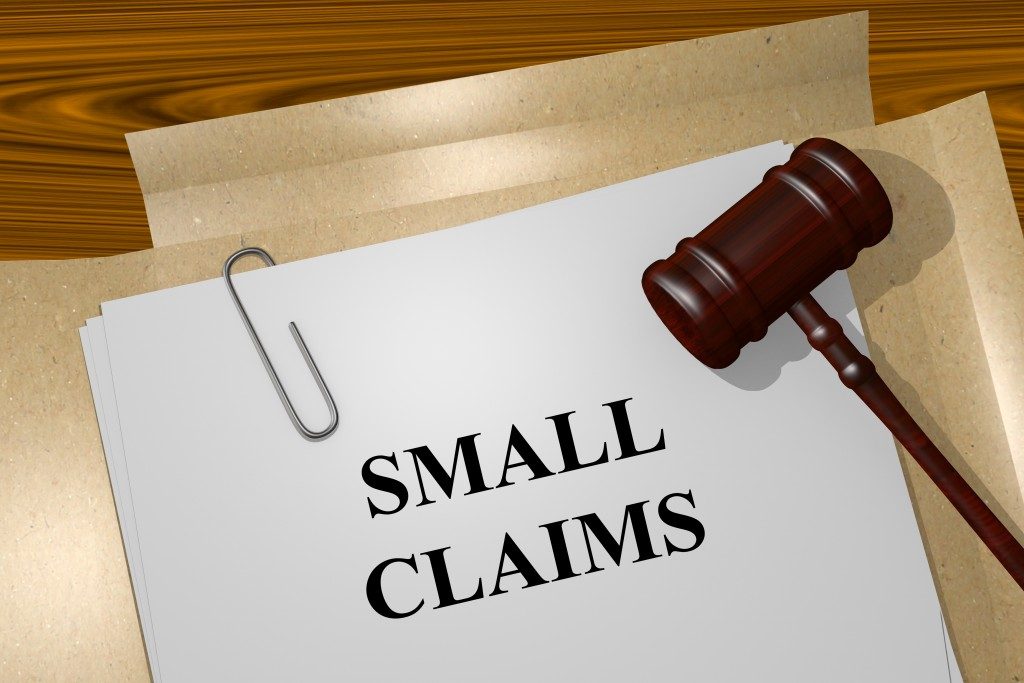
Published 26 November 2018, The Daily Tribune
Does anyone owe you money not exceeding Php300,000.00, but you do not have a lawyer to pursue your claim in court? That’s no longer a problem. You yourself can file your claim with the court even without a lawyer representing your case. The Revised Rules of Procedure for Small Claims Cases (Revised Rules), as amended, provides for a step-by-step procedure on how to do this.
The Revised Rules covers cases purely civil in nature where the claim is solely for payment or reimbursement of sum of money, not exceeding Php300,000.00. The claim or demand may be:
- for a sum of money owed under any of the following: (i) contract of loan; (ii) contract of services; (iii) contract of sale; or (iv) contract of mortgage;
- for liquidated damages arising from contracts; or
- for enforcement of a barangay amicable settlement or an arbitration award involving a money claim.
Among the salient features of the small claims procedure are the use of various forms which are obtainable from the court through its personnel, and the prohibition upon attorneys to appear or represent a party at the hearing, unless the attorney is the plaintiff or the defendant.
A small claims action is filed before the Metropolitan Trial Court (MeTC), Municipal Trial Court in Cities, Municipal Trial Courts or Municipal Circuit Trial Courts. The venue is either at the residence of the party who initiated a small claims action or of the party against whom the plaintiff has filed said action, at the option of the plaintiff.
Thus, if Pedro who lives in Makati City, owes Jose, a Quezon City resident, a sum of Php200,000.00 based on a loan contract, Jose (plaintiff) may file Form 1-SCC (Statement of Claim) against Pedro (defendant) with the MeTC, either in Quezon City or in Makati City. Form 1-SCC must be accompanied by Form 1-A-SCC (Verification and Certification of Non-Forum Shopping). Since Jose’s claim is based on a loan contract, 2 certified photocopies of such contract and other actionable document/s shall be attached to Form 1-SCC. Jose should also attach affidavits of witnesses and other supporting evidence.
If Jose has other claims against Pedro, he may join in a single statement of claim such other claims claims against Pedro provided that the total amount claimed, exclusive of interest and costs, does not exceed Php300,000.00.
Jose should also pay legal fees with the court, unless he is allowed to litigate as an indigent. If Jose is an indigent, he should accompany Form 1-SCC with Form 6-SCC (Motion to Sue as Indigent).
An indigent litigant is one (a) whose gross income and that of their immediate family do not exceed an amount double the monthly minimum wage of an employee; and (b) who do not own real property with a fair market value as stated in the current tax declaration of more than Php300,000.00. If Form 6-SCC is denied, Jose shall pay the legal fees within 5 days, otherwise, the case shall be dismissed. Note, however, even if allowed to litigate as an indigent, Jose should still pay Php1,000.00 fee for service of summons and processes.
Preliminarily, the court will determine whether Jose’s case falls under the Revised Rules. If covered, the court will either: (a) dismiss, on its own initiative, the case on any ground for the dismissal of a civil action; or (b) issue:
- Form 2-SCC (Summons), directing Pedro to file his verified Response; and
- Form 4-SCC (Notice of Hearing), directing Pedro to appear before the court on a specific date and time.
Forms 2-SCC and 4-SCC, together with Form 1-SCC and a copy of Form 3-SCC (verified Response), shall be served upon Pedro, the defendant.
Pedro should file with the court Form 3-SCC within a non-extendible 10-day period from receipt of Summons. Pedro should attach certified photocopies of document/s, witnesses’ affidavits and other supporting evidence, and may include counterclaims arising out of the same transaction or occurrence.
If Pedro fails to timely file a verified Response, and appear at the hearing, the court shall render judgment on the same day, as may be warranted by the facts. However, if Pedro fails to file his verified Response, but appears during the hearing, the court shall ascertain his defense, if any, and proceed to hear, mediate and adjudicate the case on the same day.
Jose’s failure to appear during the hearing may cause the dismissal of his claim without prejudice and Pedro who appears shall be entitled to judgment on a permissive counterclaim, if any. If both Jose and Pedro fail to appear, the claim/s and counterclaim/s, if any, may be dismissed with prejudice.
During the hearing, the judge will explain the nature, purpose and the rule of procedure of small claims cases and will exert efforts to bring Jose and Pedro to an amicable settlement. Should Jose and Pedro agree on, and execute, a compromise agreement, they should file Form 9-SCC (Motion for Approval of Compromise Agreement). Afterwards, the court will issue Form 10-SCC (Decision based on Compromise Agreement.
If efforts at settlement fail, the hearing shall proceed and be terminated within the same day.
Within 24 hours after the hearing, the court shall render its Decision (Form 11-SCC) based on the facts established by the evidence. If decision is rendered in Jose’s (plaintiff) favor, execution shall issue upon Motion for Execution (Form 12-SCC).
With the simplified and inexpensive procedure outlined above, the Revised Rules aims to protect and advance the constitutional right of persons to a speedy disposition of their small claims cases.
For comments and questions, please send email to cabdo@divinalaw.com

